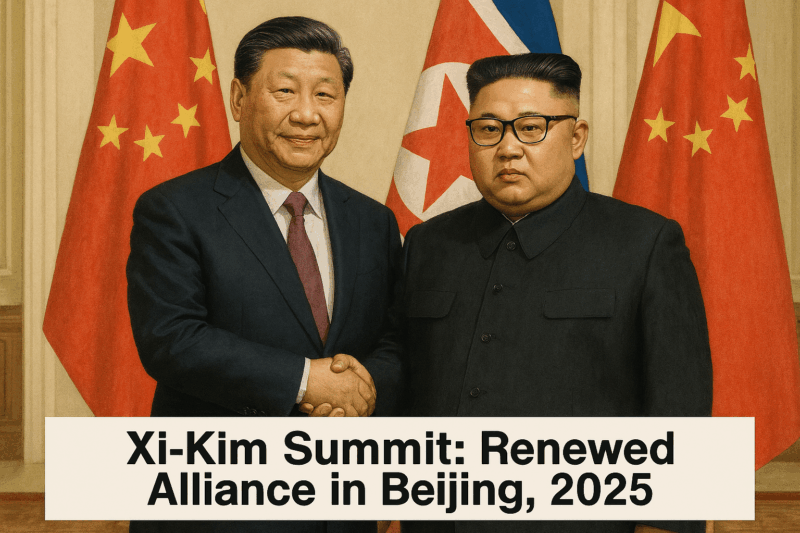Echoes of Unity in Beijing’s Halls
In the shadow of a grand military parade marking 80 years since World War II’s end, Chinese President Xi Jinping and North Korean leader Kim Jong Un convened for their first formal summit in six years on September 4, 2025. This Xi Kim summit, held at Beijing’s Great Hall of the People, symbolized a deepening bond between the two nations, as they pledged unwavering strategic coordination against Western pressures. Amid shared meals and warm handshakes, the leaders evoked a sense of enduring comradeship, yet the omission of denuclearization talks stirred quiet unease among those hoping for peace on the Korean Peninsula.
Human Toll of Enduring Divisions
The human stories behind this Xi Kim summit are poignant reminders of lives caught in geopolitical crosscurrents. For North Korean families, reliant on China’s economic lifeline amid crippling sanctions, the renewed ties offer a glimmer of stability but also perpetuate isolation, with over 25 million citizens facing food insecurity, per 2024 UN reports. In South Korea, where families remain separated by the DMZ, the silence on denuclearization evokes painful memories of stalled reunifications, touching hearts divided by history. Globally, the alliance’s anti-Western stance heightens fears for Ukrainian civilians, as North Korean troops—estimated at 10,000—bolster Russia’s war efforts, prolonging suffering in a conflict that has claimed over 500,000 lives since 2022.
Facts and Figures of the Beijing Meeting
The summit, detailed in Chinese state media, saw Xi and Kim reaffirm their 1961 mutual defense treaty, with China accounting for over 95% of North Korea’s trade—valued at $2.3 billion in 2024, per South Korean intelligence. Kim, arriving after a September 3 parade alongside Xi and Vladimir Putin, expressed “deep emotion” over China’s WWII commemoration, attended by 100,000 spectators. Notably absent from readouts was any mention of Korean Peninsula denuclearization, a staple in their four prior 2018-2019 meetings. North Korea’s nuclear arsenal, now estimated at 50 warheads by the Arms Control Association, has drawn less criticism from Beijing and Moscow, who vetoed a 2022 UN sanctions resolution.
Broader Geopolitical and Historical Context
This Xi Kim summit revives a Cold War-era alliance strained by North Korea’s pivot toward Russia, formalized in a 2024 mutual defense pact that rattled U.S. allies. Historically, the 1950-1953 Korean War forged their bond, with China sending 1.3 million troops to aid Pyongyang. Today, amid U.S.-China trade frictions and Russia’s Ukraine invasion, the trio’s parade unity—first-time side-by-side appearance—signals a counter to Western sanctions, which have isolated North Korea more than any other nation, per the UN. Analysts like Wu Qiang note Beijing’s tacit acceptance of Pyongyang’s nuclear status, shifting from past pressure for talks. In South Korea, experts such as Lim Eul-chul interpret this as justification for Kim’s arsenal expansion, echoing 2017’s missile tests that heightened regional alarms.
Strategic Shifts and Uneasy Partnerships
The summit hints at China’s wariness of the Russia-North Korea pact, which includes military tech exchanges. Beijing, providing 70% of North Korea’s oil imports despite sanctions, seeks to maintain influence without alienating Moscow, its key partner in a 2024 “no-limits” declaration.
What Lies Ahead: Balancing Alliances and Stability
As the Xi Kim summit concludes, the path forward demands careful navigation. North Korea’s troop deployments to Ukraine—up to 12,000 by late 2025, per U.S. estimates—could strain China’s regional balancing act, risking escalation. Global lessons from the 1994 Agreed Framework, which briefly curbed North Korea’s program before collapse, urge renewed diplomacy. Resilience lies in multilateral talks, perhaps via the UN, to address sanctions evasion and nuclear proliferation. For ordinary citizens on the Peninsula, adaptation means hoping this alliance fosters economic relief without further militarization, ensuring a future where shared destiny translates to shared peace.
Conclusion: Reflections on the Xi Kim Summit’s Shadow
The Xi Kim summit of 2025, born from parade pomp and private pledges, reaffirms a bond tested by time and turmoil. Yet, in its silences on denuclearization, it casts a long shadow over hopes for reconciliation. As these leaders stand united against the West, the world yearns for dialogue that honors the human cost of division, paving a steadier path toward stability.






